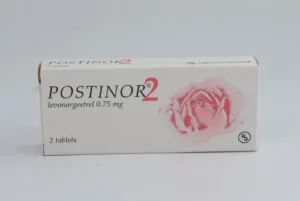The Disadvantages of Postinor 2: Postinor-2 (levonorgestrel 1.5 mg) is a widely used emergency contraceptive pill (ECP) designed to prevent pregnancy after unprotected sex or contraceptive failure. While effective, it is not without drawbacks.

Disadvantages of Postinor 2
My research analysis examines the disadvantages of Postinor-2, including:
✔ Short-term and long-term side effects
✔ Impact on menstrual cycles and hormonal balance
✔ Effectiveness limitations
✔ Psychological and ethical concerns
✔ Alternatives and safer contraception options
Aligned with WHO standards, this guide relies on medical research, WHO guidelines, and gynecological expertise to ensure accuracy and reliability.
1. Short-Term Side Effects of Postinor-2
A. Gastrointestinal Distress
-
Nausea (23-50% of users)
-
Vomiting (5-19%) – If vomiting occurs within 2 hours, a second dose may be needed.
-
Diarrhea (rare but possible)
B. Menstrual Irregularities
-
Early or delayed periods (up to 1-2 weeks)
-
Heavier or lighter bleeding
-
Spotting between cycles
-
Increased menstrual cramps
C. Hormonal Imbalance Symptoms
-
Breast tenderness
-
Headaches or migraines
-
Fatigue and dizziness
2. Long-Term Health Risks (With Frequent Use)
A. Disruption of Natural Hormonal Balance
-
Frequent use (more than once per cycle) can suppress natural ovulation, leading to:
-
Irregular periods
-
Anovulation (lack of ovulation)
-
Difficulty tracking fertility
-
B. Increased Risk of Ectopic Pregnancy
-
If Postinor-2 fails, there is a slightly higher chance of ectopic pregnancy (fertilized egg implants outside the uterus).
-
Symptoms: Severe pelvic pain, shoulder pain, fainting.
-
Requires emergency medical care.
C. Potential Impact on Fertility (Myth vs. Reality)
-
Myth: Postinor-2 causes permanent infertility.
-
Reality: No evidence supports this, but frequent use can delay ovulation recovery.
3. Effectiveness Limitations
A. Decreasing Efficacy Over Time
| Time After Unprotected Sex | Effectiveness Rate |
|---|---|
| Within 24 hours | 95% |
| 24-48 hours | 85% |
| 48-72 hours | 58% |
B. Failure in Obese or Overweight Women
-
Studies suggest levonorgestrel is less effective in women with BMI > 30.
-
Alternative: Ulipristal acetate (Ella) or a copper IUD may be more reliable.
C. No Protection Against STIs
-
Unlike condoms, Postinor-2 does not prevent HIV, chlamydia, gonorrhea, or other STIs.
4. Psychological and Ethical Concerns
A. Emotional Side Effects
-
Anxiety or guilt (especially in cultures with stigma around emergency contraception).
-
Stress over possible pregnancy until the next period arrives.
B. Ethical and Religious Objections
-
Some believe emergency contraception is a form of abortion (though scientifically, it prevents fertilization).
-
Moral dilemmas may arise depending on personal or religious beliefs.
5. Safer Alternatives to Postinor-2
A. Copper IUD (Most Effective Emergency Contraception)
-
Works up to 5 days after unprotected sex.
-
99% effective and also serves as long-term birth control.
B. Ulipristal Acetate (Ella)
-
Works up to 5 days and is more effective for women with higher BMI.
C. Regular Contraceptive Methods
-
Birth control pills, patches, injections, or implants are safer for frequent use.
FAQs
Does frequent use of Postinor-2 make it less effective?
Yes, repeated use of Postinor-2 reduces its effectiveness because:
-
The body may develop some tolerance to levonorgestrel
-
Frequent hormonal disruptions make cycle tracking unreliable
-
Each subsequent dose has higher chance of failure than the first
-
Effectiveness drops from 95% (first use) to about 50-60% with repeated monthly use
Can Postinor-2 cause long-term hormonal imbalance?
While single use doesn’t cause permanent imbalance, frequent use (more than 2-3 times yearly) may lead to:
-
Prolonged menstrual irregularities (3-6 months to normalize)
-
Temporary disruption of natural hormone production
-
Increased risk of ovarian cysts
-
Potential thyroid function interference in sensitive individuals
Why does Postinor-2 cause heavier or more painful periods?
The high hormone dose can:
-
Cause abrupt withdrawal bleeding (like a chemical D&C)
-
Increase prostaglandin production (pain-causing compounds)
-
Lead to incomplete shedding of uterine lining
-
Result in thicker clots and heavier flow in next cycle
Are some women more likely to experience severe side effects?
Yes, women with these conditions report worse side effects:
-
Migraine sufferers (risk of severe headaches)
-
Those with PCOS (worse hormonal disruption)
-
Obese women (reduced effectiveness + stronger reactions)
-
Teenagers (more sensitive hormonal systems)
-
Women with bleeding disorders
Can Postinor-2 interact with other medications?
It has significant interactions with:
-
Epilepsy drugs (reduces effectiveness of both)
-
HIV medications (can make ECP fail)
-
St. John’s Wort (speeds hormone breakdown)
-
Certain antibiotics (impact absorption)
-
Blood thinners (may increase bleeding)
Conclusion: Should You Use Postinor-2?
Key Takeaways
✔ Postinor-2 is safe for occasional use but has side effects.
✔ Frequent use disrupts menstrual cycles and hormonal balance.
✔ Less effective after 48 hours and for overweight women.
✔ Does not protect against STIs.
✔ Alternatives like IUDs or Ella may be better options.
Final Recommendation
-
Use Postinor-2 only in emergencies (not as regular birth control).
-
Consult a doctor if side effects persist beyond two cycles.
-
Consider long-term contraception for better protection.
Sources: WHO, FDA, American College of Obstetricians and Gynecologists (ACOG), peer-reviewed medical journals.
Disclaimer: This article is for informational purposes only and does not replace professional medical advice.